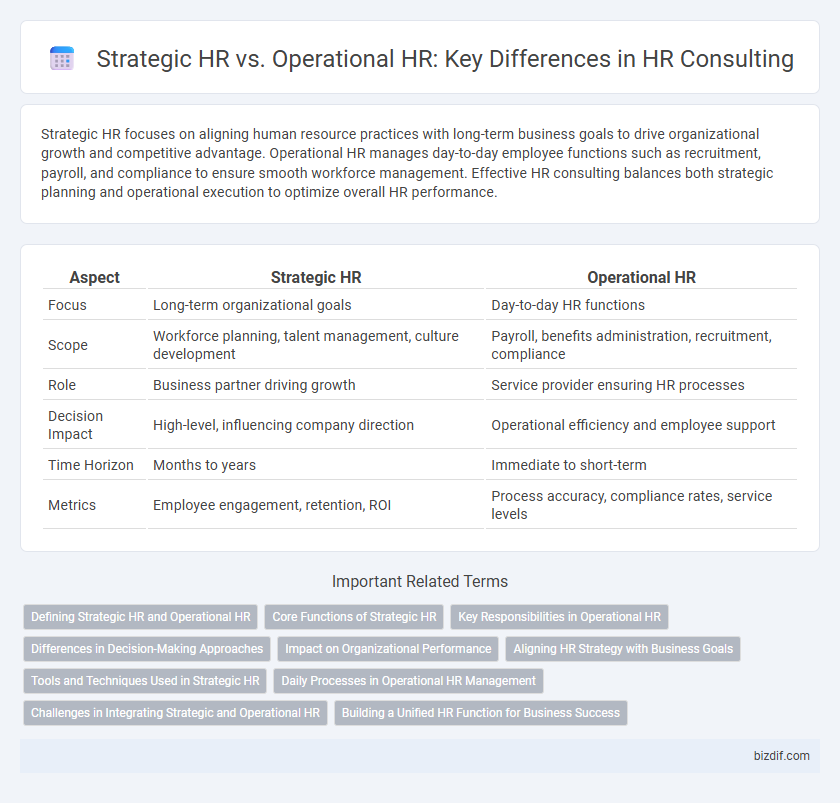Strategic HR focuses on aligning human resource practices with long-term business goals to drive organizational growth and competitive advantage. Operational HR manages day-to-day employee functions such as recruitment, payroll, and compliance to ensure smooth workforce management. Effective HR consulting balances both strategic planning and operational execution to optimize overall HR performance.
Table of Comparison
| Aspect | Strategic HR | Operational HR |
|---|---|---|
| Focus | Long-term organizational goals | Day-to-day HR functions |
| Scope | Workforce planning, talent management, culture development | Payroll, benefits administration, recruitment, compliance |
| Role | Business partner driving growth | Service provider ensuring HR processes |
| Decision Impact | High-level, influencing company direction | Operational efficiency and employee support |
| Time Horizon | Months to years | Immediate to short-term |
| Metrics | Employee engagement, retention, ROI | Process accuracy, compliance rates, service levels |
Defining Strategic HR and Operational HR
Strategic HR focuses on aligning human resource practices with long-term business goals to drive organizational growth and competitiveness. Operational HR involves managing day-to-day employee functions such as recruitment, payroll, compliance, and performance management to ensure smooth workforce operations. Together, they create a balance between forward-looking workforce planning and efficient execution of HR processes.
Core Functions of Strategic HR
Strategic HR centers on aligning human capital with long-term business goals through workforce planning, talent management, and leadership development. Core functions include analyzing organizational needs, designing performance metrics, and fostering employee engagement to drive competitive advantage. These elements ensure HR contributes proactively to business growth rather than merely handling day-to-day operational tasks.
Key Responsibilities in Operational HR
Operational HR focuses on day-to-day employee management, including payroll administration, benefits coordination, and compliance with labor laws. Key responsibilities encompass onboarding, maintaining employee records, and handling employee relations to ensure workplace efficiency. This hands-on approach supports organizational stability and employee satisfaction through consistent policy enforcement and timely issue resolution.
Differences in Decision-Making Approaches
Strategic HR focuses on long-term organizational goals, making decisions based on workforce analytics, talent forecasting, and alignment with business strategy. Operational HR handles day-to-day functions such as employee relations, payroll, and compliance, emphasizing immediate problem-solving and process efficiency. Decision-making in strategic HR is proactive and data-driven, while operational HR decisions are reactive and centered on routine management.
Impact on Organizational Performance
Strategic HR drives organizational performance by aligning human capital initiatives with long-term business goals, enhancing workforce capabilities and fostering innovation. Operational HR focuses on day-to-day employee management, payroll, and compliance, ensuring smooth internal processes and employee satisfaction. Together, these functions create a balanced approach that improves productivity, employee engagement, and overall company success.
Aligning HR Strategy with Business Goals
Aligning HR strategy with business goals enhances organizational performance by ensuring talent management, workforce planning, and leadership development directly support core objectives. Strategic HR focuses on long-term initiatives such as culture shaping and competitive talent acquisition, while operational HR manages daily functions like payroll, compliance, and employee relations. Integrating both approaches drives agility and sustainable growth through effective resource allocation and proactive workforce optimization.
Tools and Techniques Used in Strategic HR
Strategic HR employs advanced workforce analytics, predictive modeling, and talent segmentation tools to align human capital with long-term business goals. Techniques include scenario planning, competency mapping, and continuous performance management systems that forecast future skill needs and optimize employee development. These tools enable HR leaders to drive organizational agility and sustain a competitive advantage through data-driven decision-making.
Daily Processes in Operational HR Management
Operational HR management primarily involves the execution of daily processes such as payroll administration, employee attendance tracking, and benefits management. These routine tasks ensure workforce efficiency and compliance with labor regulations, supporting the organization's overall functionality. Strategic HR focuses on long-term planning and aligning human capital with business goals, whereas operational HR emphasizes seamless day-to-day operations.
Challenges in Integrating Strategic and Operational HR
Integrating strategic and operational HR faces significant challenges such as aligning long-term organizational goals with daily HR processes, managing resource constraints, and overcoming communication gaps between strategy developers and operational teams. Balancing these distinct functions requires robust data analytics, agile change management, and a unified technology platform to ensure consistent policy implementation and workforce performance monitoring. Effective integration increases agility, drives business value, and enhances employee engagement through a cohesive HR approach.
Building a Unified HR Function for Business Success
Strategic HR focuses on aligning human resource initiatives with overall business goals, driving long-term growth and competitive advantage, while operational HR manages day-to-day employee administration and compliance. Building a unified HR function integrates these roles, promoting seamless communication, enhanced workforce productivity, and consistent policy implementation. This comprehensive approach ensures agility in talent management and supports sustained business success.
Strategic HR vs Operational HR Infographic

 bizdif.com
bizdif.com